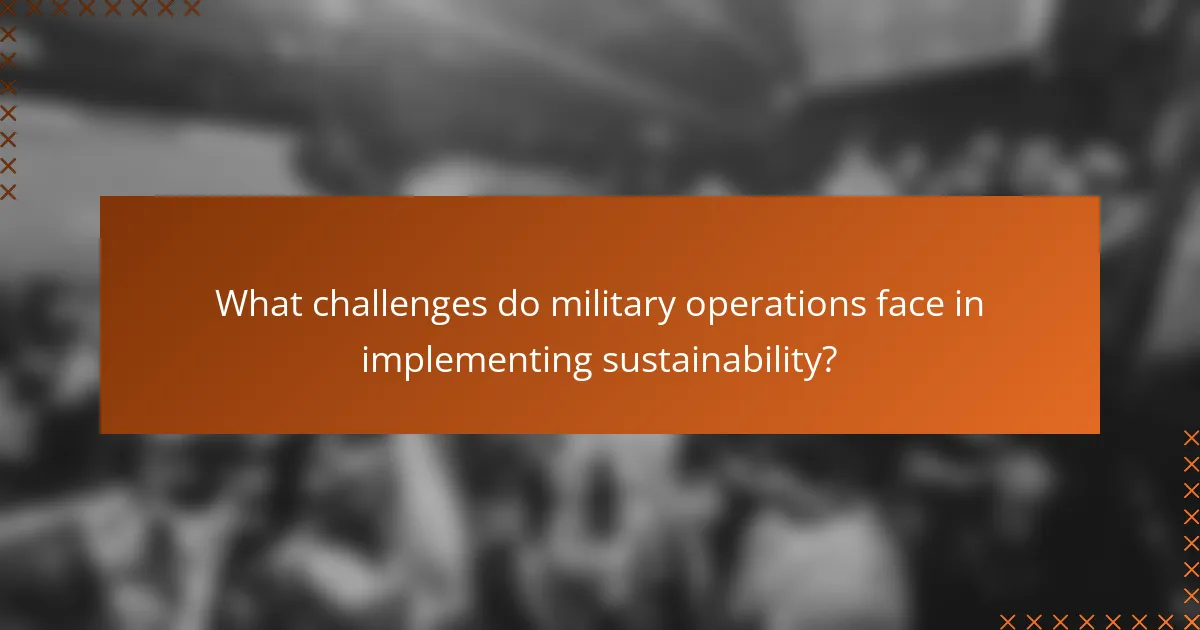Sustainability practices in military operations focus on strategies designed to reduce environmental impact while enhancing operational effectiveness. Key initiatives include energy efficiency, waste reduction, resource conservation, and the use of renewable energy sources such as solar and wind. Despite challenges like resource limitations, budget constraints, and resistance to change, best practices such as efficient logistics, personnel training, and collaboration with environmental organizations are being implemented. These measures not only align with the military’s commitment to environmental stewardship but also contribute to improved mission readiness and reduced operational costs. The article highlights innovations presented at Army Science Conferences that showcase these sustainable practices.

What are Sustainability Practices in Military Operations?
Sustainability practices in military operations encompass strategies aimed at minimizing environmental impact. These practices include energy efficiency, waste reduction, and resource conservation. The military employs renewable energy sources like solar and wind to power installations. Sustainable logistics practices reduce fuel consumption and emissions during transport. Water conservation initiatives ensure efficient use of water resources in operations. Recycling and proper waste management practices are implemented to minimize landfill use. These measures align with the military’s commitment to environmental stewardship and operational effectiveness. Studies indicate that sustainable practices can enhance mission readiness and reduce costs over time.
How do sustainability practices impact military effectiveness?
Sustainability practices enhance military effectiveness by improving resource efficiency and operational resilience. Implementing renewable energy sources reduces dependence on fuel logistics. This shift can lead to faster deployment and lower operational costs. Sustainable practices also minimize environmental impact, promoting better relationships with local communities. Studies show that militaries adopting green technologies experience improved troop morale and readiness. For example, the U.S. Army’s use of solar energy in remote bases has proven effective in maintaining operations. Overall, these practices contribute to a more agile and responsive military force.
What are the key components of sustainability in military contexts?
The key components of sustainability in military contexts include resource efficiency, waste management, and energy conservation. Resource efficiency focuses on minimizing the consumption of materials and optimizing their use. Effective waste management involves reducing, reusing, and recycling materials to minimize environmental impact. Energy conservation emphasizes the use of renewable energy sources and reducing fossil fuel dependency. These components contribute to operational effectiveness while minimizing ecological footprints. The U.S. Department of Defense has implemented initiatives to enhance sustainability, such as the Net Zero program, which aims for zero waste and energy efficiency in military installations.
Why is sustainability important for military operations?
Sustainability is important for military operations because it enhances operational efficiency and reduces environmental impact. Sustainable practices lead to improved resource management. The military can lower costs by optimizing energy use and minimizing waste. For instance, the U.S. Army’s Net Zero initiative aims to achieve net-zero energy, water, and waste at installations. This initiative can save millions in energy costs annually. Furthermore, sustainability supports mission readiness by ensuring that resources are available during extended deployments. It also fosters resilience against climate change, which poses risks to military infrastructure. By integrating sustainability, military operations can maintain effectiveness while protecting the environment.
What innovations are being introduced at Army Science Conferences?
Innovations introduced at Army Science Conferences include advanced energy solutions, sustainable materials, and enhanced waste management systems. These innovations aim to improve operational efficiency and reduce environmental impact. For instance, new solar energy technologies are being showcased to power military installations. Additionally, biodegradable materials are being developed for use in packaging and equipment. Innovations in waste management focus on recycling and reducing waste generated during operations. These advancements align with the military’s commitment to sustainability and environmental stewardship.
How do these innovations contribute to sustainability?
Innovations in military operations contribute to sustainability by enhancing resource efficiency and reducing environmental impact. These advancements often involve the use of renewable energy sources, such as solar and wind power. For instance, the integration of solar panels in field operations decreases reliance on fossil fuels. Additionally, innovations in waste management technologies minimize landfill waste and promote recycling. Research shows that implementing these practices can reduce carbon footprints by up to 30%. Furthermore, advancements in fuel-efficient vehicles and equipment lead to lower emissions during missions. Collectively, these innovations support the military’s commitment to sustainability while maintaining operational readiness.
What are some examples of innovative practices showcased?
Innovative practices showcased include the use of biofuels in military vehicles. These biofuels reduce reliance on fossil fuels and lower greenhouse gas emissions. Another example is the implementation of solar energy systems for powering field operations. Solar panels provide renewable energy in remote locations, enhancing energy independence. Additionally, water purification technologies were presented, improving access to clean water in operational theaters. These technologies utilize advanced filtration methods to ensure safe drinking water. Furthermore, waste management systems that convert waste into energy were highlighted. These systems minimize environmental impact and provide alternative energy sources.

What challenges do military operations face in implementing sustainability?
Military operations face several challenges in implementing sustainability. Resource limitations hinder the adoption of sustainable technologies. Budget constraints often prioritize immediate operational needs over long-term sustainability goals. The complexity of military logistics complicates the integration of sustainable practices. Additionally, resistance to change within established military cultures can impede progress. Environmental regulations may conflict with operational requirements, creating further obstacles. Finally, the need for rapid deployment in various environments limits the ability to implement sustainable solutions effectively.
How can these challenges be addressed through innovation?
Innovative technologies can address sustainability challenges in military operations. For instance, renewable energy sources can reduce reliance on fossil fuels. Solar panels and wind turbines can be deployed in remote areas. These technologies have proven effective in decreasing operational costs. Additionally, advancements in battery storage improve energy efficiency. Smart logistics systems can optimize supply chains, reducing waste. Research shows that implementing these innovations can lower carbon footprints significantly. The Army’s commitment to sustainability reflects in its investment in green technologies.
What role does technology play in overcoming sustainability challenges?
Technology plays a crucial role in overcoming sustainability challenges by enhancing efficiency and reducing resource consumption. Advanced technologies enable the military to optimize logistics and supply chains. For instance, predictive analytics can forecast equipment needs, minimizing waste. Renewable energy technologies, such as solar and wind, provide sustainable power sources for operations. Smart sensors monitor environmental impacts, allowing for real-time adjustments. Additionally, innovations in materials science lead to the development of eco-friendly materials. These technologies contribute to the military’s goal of reducing its carbon footprint. Overall, technology facilitates the integration of sustainable practices in military operations.
How can collaboration enhance sustainability efforts in military operations?
Collaboration enhances sustainability efforts in military operations by pooling resources and expertise. Joint initiatives can lead to innovative solutions for energy efficiency. For instance, the U.S. Army has partnered with private sectors to develop renewable energy technologies. These collaborations have resulted in reduced fuel consumption and lower greenhouse gas emissions. Research shows that collaborative frameworks can improve logistical operations, minimizing waste. The Army’s participation in the Energy Security and Sustainability Working Group exemplifies effective collaboration. This group focuses on integrating sustainable practices across military branches. Ultimately, collaboration fosters a culture of sustainability that benefits military readiness and environmental stewardship.
What are the future trends in sustainability practices for the military?
Future trends in sustainability practices for the military include increased reliance on renewable energy sources and enhanced energy efficiency measures. The military is investing in solar and wind energy to power bases and operations. This shift aims to reduce dependence on fossil fuels, which can be logistically challenging. Additionally, the military is exploring the use of biofuels in aircraft and vehicles. These alternatives can lower carbon emissions and provide operational flexibility.
The adoption of sustainable materials in construction and maintenance is also a key trend. Green building practices are being implemented in new military facilities. These practices can lead to reduced waste and lower operational costs over time. Furthermore, advancements in waste management technologies are being prioritized. This includes recycling initiatives and waste-to-energy systems that minimize landfill use.
Lastly, the military is focusing on sustainable logistics. This involves optimizing supply chains to reduce environmental impact. Implementing these trends can enhance operational readiness while promoting environmental stewardship.
How might emerging technologies shape these trends?
Emerging technologies will significantly enhance sustainability practices in military operations. Innovations such as renewable energy sources, advanced materials, and smart logistics systems contribute to reduced environmental impact. For example, solar energy integration can decrease reliance on fossil fuels. Additionally, 3D printing technology can minimize waste by producing only necessary components on-site. Data analytics improves resource allocation and efficiency, leading to lower emissions. These advancements align with military goals for operational effectiveness while promoting ecological responsibility. The integration of these technologies is supported by ongoing research and development efforts showcased at Army Science Conferences.
What are the potential impacts of these trends on military operations?
The potential impacts of sustainability trends on military operations include enhanced efficiency and reduced environmental footprint. These practices can lead to lower operational costs through energy savings. For example, the integration of renewable energy sources can decrease reliance on fuel logistics. This shift can also improve mission readiness by ensuring energy availability. Moreover, sustainable practices can foster better relationships with local communities. They can enhance the military’s image as a responsible entity. Implementing these trends can also drive technological innovation within military systems. Historical data indicates that sustainable initiatives have led to significant advancements in military capabilities.

What best practices can be adopted for sustainability in military operations?
Best practices for sustainability in military operations include implementing energy-efficient technologies and optimizing resource management. Utilizing renewable energy sources, such as solar and wind, reduces dependency on fossil fuels. Efficient logistics and supply chain management minimize waste and enhance operational effectiveness. Training personnel on sustainability practices fosters a culture of environmental responsibility. Additionally, integrating sustainable materials in equipment and infrastructure supports long-term ecological balance. Collaboration with environmental organizations can provide valuable insights and guidance. These practices have been shown to decrease operational costs and improve mission readiness.
How can military organizations implement effective sustainability strategies?
Military organizations can implement effective sustainability strategies by adopting renewable energy sources. Utilizing solar, wind, and bioenergy can significantly reduce reliance on fossil fuels. Implementing energy-efficient technologies in facilities and operations further enhances sustainability. Establishing recycling programs for waste management promotes resource conservation. Collaborating with environmental organizations can help develop best practices. Training personnel on sustainability principles ensures widespread adoption. Monitoring and assessing sustainability initiatives can identify areas for improvement. According to the U.S. Army’s Environmental Command, these practices lead to operational resilience and cost savings.
What are the benefits of adopting a sustainability framework?
Adopting a sustainability framework enhances operational efficiency and reduces environmental impact. It promotes resource conservation, leading to cost savings. Implementing such frameworks can improve mission readiness by ensuring sustainable supply chains. Additionally, they foster innovation in technologies and practices. Evidence shows that military operations adopting sustainability practices have reduced waste by up to 30%. This reduction contributes to lower operational costs and improved public perception. Furthermore, sustainable practices can enhance resilience against climate-related challenges. Overall, a sustainability framework aligns military objectives with environmental stewardship.
How can training and education improve sustainability practices?
Training and education can significantly improve sustainability practices by enhancing knowledge and skills related to environmental stewardship. Effective training programs equip personnel with the tools to implement sustainable practices in military operations. Education fosters awareness of the environmental impact of military activities. It encourages innovative thinking for resource conservation and waste reduction. For example, training on energy-efficient technologies can lead to reduced fuel consumption in operations. Studies show that organizations with sustainability training see a 20% improvement in resource management. Additionally, education promotes a culture of sustainability, encouraging collective responsibility among personnel. This leads to long-term commitment to environmentally friendly practices.
What resources are available for military personnel to enhance sustainability practices?
Military personnel can access various resources to enhance sustainability practices. The U.S. Army’s Environmental Command provides guidelines and training for sustainable operations. The Army’s Sustainability Strategy outlines initiatives for energy efficiency and waste reduction. The Defense Logistics Agency offers sustainable procurement options for materials. Additionally, the Army Corps of Engineers conducts research on sustainable technologies. The Army’s Net Zero program aims for zero waste, energy, and water usage on installations. These resources collectively support military personnel in implementing sustainable practices effectively.
How can military leaders promote a culture of sustainability?
Military leaders can promote a culture of sustainability by integrating sustainable practices into military operations. They should prioritize the use of renewable energy sources, such as solar and wind power, to reduce reliance on fossil fuels. Implementing energy-efficient technologies in military equipment can also lower energy consumption.
Training and educating personnel on sustainability practices is essential for fostering awareness and commitment. Leaders should encourage recycling and waste reduction initiatives within military facilities. Establishing partnerships with environmental organizations can enhance sustainability efforts and provide additional resources.
Moreover, setting measurable sustainability goals and reporting progress can motivate personnel to engage in sustainable practices. The U.S. Army has adopted a goal to achieve net-zero energy by 2030, demonstrating a commitment to sustainability. This approach not only benefits the environment but also improves operational efficiency and readiness.
What steps can individuals take to contribute to sustainability in military operations?
Individuals can contribute to sustainability in military operations by adopting energy-efficient practices. They can utilize renewable energy sources like solar panels during deployments. Implementing waste reduction strategies is also critical. This includes recycling materials and minimizing single-use plastics. Training personnel on sustainable practices enhances awareness and compliance. Using sustainable transportation options reduces carbon footprints. Regularly assessing and updating sustainability policies ensures ongoing improvement. Collaborating with environmental organizations can provide additional resources and expertise.
Sustainability practices in military operations focus on minimizing environmental impact through strategies such as energy efficiency, waste reduction, and resource conservation. The article explores how these practices enhance military effectiveness, improve resource management, and foster better community relationships. Key components include the integration of renewable energy sources, advanced waste management technologies, and innovative materials showcased at Army Science Conferences. Challenges in implementation are addressed through collaboration and emerging technologies, while best practices and training initiatives are highlighted to promote a culture of sustainability within military organizations.